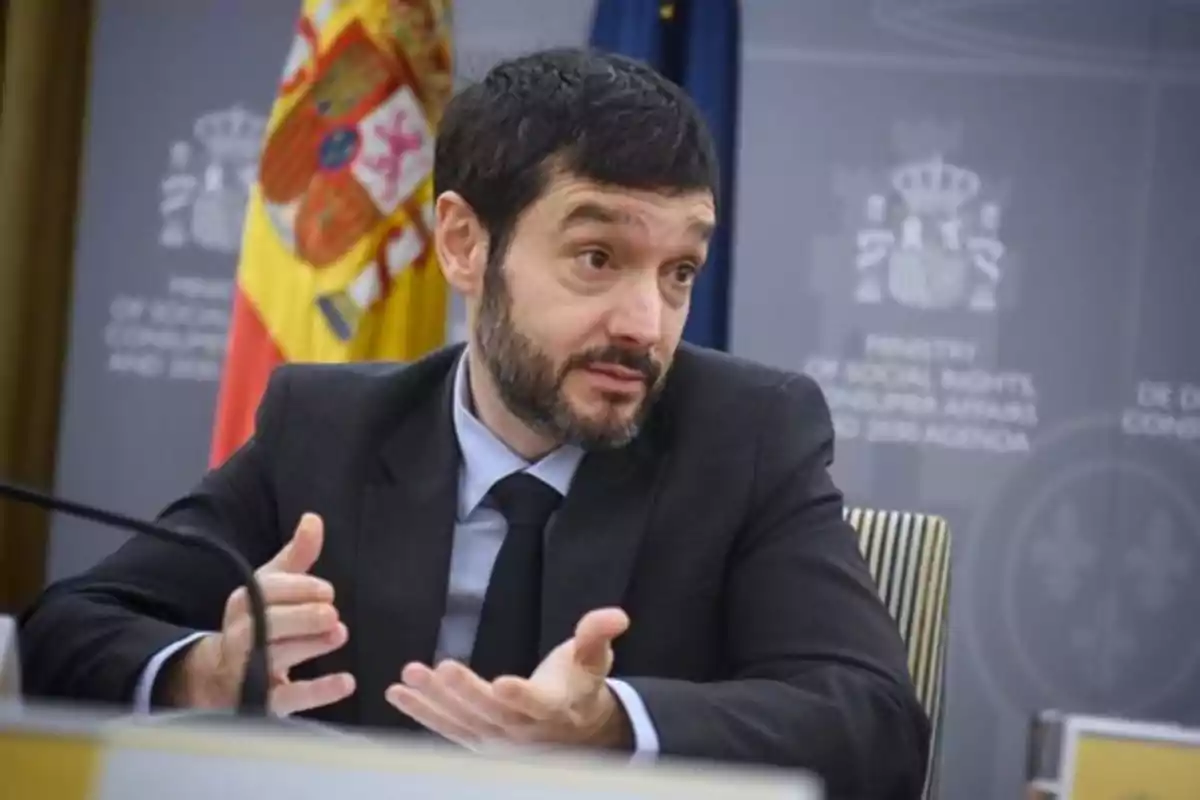
Pablo Bustinduy emerges as a future leader in Sumar after Yolanda Díaz's downfall
The Minister of Social Rights, Consumer Affairs, and the 2030 Agenda could win the internal battle against Ernest Urtasun, who is viewed very negatively among the traditional left
Pablo Bustinduy is emerging as a key figure within Sumar's political space after Yolanda Díaz's decline and Íñigo Errejón's forced withdrawal. In a context of left-wing fragmentation and a lack of clear leadership, Bustinduy is beginning to stand out as one of the most promising voices within a coalition that is still searching for its direction.
Although until recently he kept a low profile, his growing visibility has been driven by several public interventions. These have been forceful. At a time when Yolanda Díaz has chosen to step back, after her resignation from leading Sumar following last year's poor results in the European elections, and when figures like Ernest Urtasun haven't managed to fully connect with the grassroots or generate enthusiasm, Bustinduy is gaining influence. Not just because of his proposals, but also because of his style.
His discourse has allowed him to distance himself from the more technocratic image of other Sumar leaders. He has been one of the few to raise his voice against PSOE figures, as in the case of Santos Cerdán. He has shown that he has no qualms about entering uncomfortable but highly symbolic battles, such as his open criticism of abusive practices in the real estate sector (Idealista). Or his complaints against Ryanair, which has launched a campaign against him.

Despite his initial closeness to Podemos and later to the Más País circle, Bustinduy keeps a position of autonomy today. This allows him to build bridges between opposing sectors on the left without it seeming opportunistic. Although he was once a trusted man of Pablo Iglesias, his departure from politics in 2019, when he refused to head Unidas Podemos's candidacy for the European Parliament, was seen as a gesture of personal honesty rather than political calculation. This profile gives him added value today in a scenario where citizens perceive internal power games with growing distrust.
Son Of A Socialist Minister
Born in Madrid in 1983, Pablo Bustinduy comes from a family strongly linked to progressive thought. The minister is the son of Ángeles Amador, former socialist Minister of Health. He has been connected to left-wing intellectual circles since he was young.
The leader studied Philosophy at the Complutense University of Madrid and earned his doctorate in New York. During his academic training years, he was a scholarship holder, researcher, and teacher. He joined Podemos at its inception. He was one of the project's masterminds, playing an important role in the party's international relations.
He was a Member of the European Parliament and a member of key committees in the European Parliament, where he left a mark for his discreet and effective work. During that time, he earned the respect of diverse sectors, from grassroots activists to colleagues from other European parties.
The temporary withdrawal from politics that he decided in 2019 reinforced an unusual image in national politics. That of someone who doesn't seek power for power's sake. This break allowed him to return with a renewed image, without the wear and tear of other faces in the progressive space. His return to the political scene with Sumar was in a more discreet role at first. But his rise is now evident.
Between Ethics And Strategy
Bustinduy is gaining ground not only because of his ideas, but also because of the tone and style with which he defends them. His way of speaking, calm but firm, manages to make a difference without resorting to noise. In an era of polarization, his conciliatory yet resolute style allows him to attract support among disenchanted progressive voters. While he doesn't spark overwhelming enthusiasm among the hardest sectors of Podemos, he doesn't generate rejection either. This positions him as a potential consensus figure.

Bustinduy contrasts with leaders of Sumar, such as Ernest Urtasun. The Minister of Culture is more identified with the diplomatic world. He is seen as an icon of the "posh left." Urtasun, although respected, is perceived by some sectors as excessively moderate and elitist.
In contrast, Bustinduy hasn't hesitated to take a clear stance on international issues. An example of this is his vehement defense of the Palestinian people amid the genocide Israel is subjecting them to. Or in his complaints against corporate abuses. These causes allow him to build a narrative consistent with the traditional values of transformative left-wing politics. Meanwhile, Yolanda Díaz seems exhausted as a reference, Bustinduy is making his way as an option.
In a context of internal crisis in Sumar, his figure represents an opportunity to refound the space with Podemos's approval. The purples continue on their own path while continuing to grow in the polls. Some voices suggest that reconciliation between the two camps could come through the creation of a joint electoral list. This would be led by Irene Montero and Bustinduy could serve as number 2.
More posts: